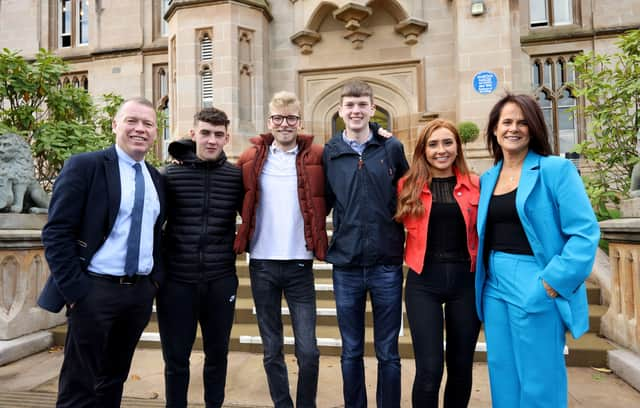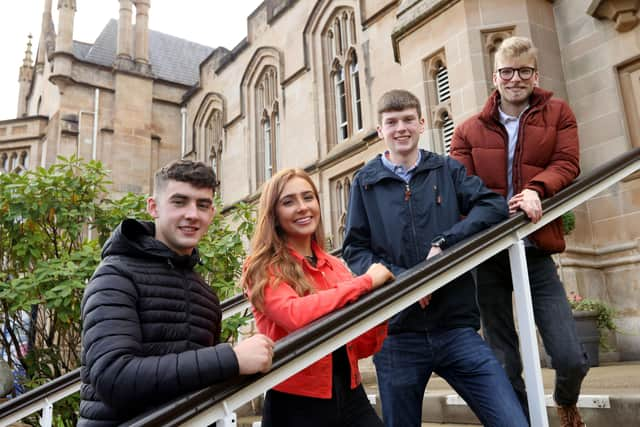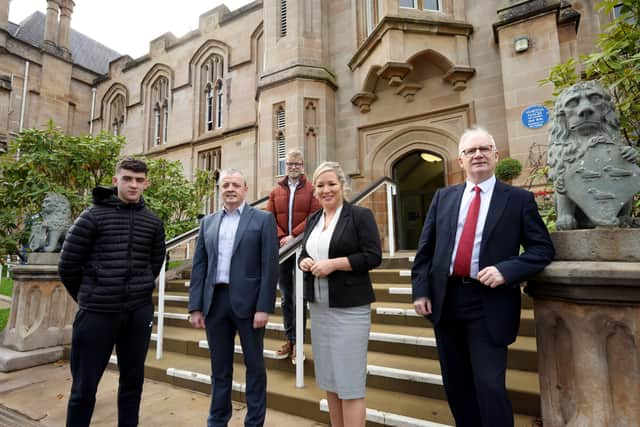Meet apprentices helping NW compete on world stage of innovation


Conor Brattin and Zara Chambers are among the first intake of 14 students on the pioneering course which combines theory-based learning with paid employment in sponsor companies across the region.
The four-year, Level 6 honours degree apprenticeship sees Ulster University partner with the network for Manufacturing and Engineering Growth and Advancement (MEGA) to create a pipeline of skilled talent fit for industry’s needs.
Advertisement
Hide AdAdvertisement
Hide AdIt also supports the Derry and Strabane City Deal’s plan for the North West to become the robotics centre for Ireland and a Centre for Industrial Digitalisation, Robotics and Automation (CIDRA).


To find out how the course is going, we spoke to first-year apprentice students, Conor and Zara, Dr Justin Quinn, Senior Lecturer at the School of Computing, Engineering and Intelligent Systems at Magee, and employer Leigh Falls, of Nugent Engineering.
Conor Brattin, a first-year degree apprentice from Eglinton, says: “Growing up, I’ve always been into fixing stuff around the house - lawnmowers, strimmers, I just liked being hands on. I went to school at Oakgrove and had applied for the full-time engineering degree course at Ulster University’s Derry campus at Magee when I heard about the new degree.
“In the first year of the degree, it’s four days a week at uni, then, for the next three years, it’s one day a week at uni and four days with the industrial sponsor. I’d always wanted to do an apprenticeship, so I applied, went for an interview and a visit and started at Nugent Engineering, based just outside Dungannon, within a matter of weeks. In the end, it all happened very quickly. I started with Nugent Engineering in June, so I got a good run at it over the summer and got a bit of experience before starting classes.
Advertisement
Hide AdAdvertisement
Hide Ad“My role is to do with setting up their robots. Nugent is keen on automation, which will tie in very well with my uni work. The’ve got a brand-new machine for laser cutting which just came recently and is all automated. From the start of the summer, I have been building robot cells [a system including a robot, controller and other machinery]. I ‘ve learnt lots of different processes like welding, drilling, tapping, all the safety parts of it, and I really enjoyed it.


“I’ve only been doing the course at Magee for a few weeks, but working with Nugent has given me that background knowledge of how things work in an industry environment and how we might apply the theory I’m learning at uni . I’m lucky with Nugent, it’s very hands on. If I do a drawing, I can build it, too.
“Getting on campus and meeting my classmates has been brilliant, too. The group of apprentices is a brilliant group and we’re all quite like-minded; we can relate things to work and compare what we’re doing. “Some of my friends who’ve gone to uni are only in three or four half days, never mind full days! But I’m loving it. The stuff we’re doing is right up my street and having that insight into industry has given me a bit more drive. I can apply myself better to uni work because I know I’m working towards something and there’s an end goal there. I’m enjoying it - that’s the main thing.”
Zara Chambers, from Co. Tyrone, is another first year degree apprentice. She’s working with SpecDrum in Dungannon.
Advertisement
Hide AdAdvertisement
Hide AdShe says: “I spent about two weeks with them in September and I’ve been here, at Magee, ever since, living in halls.
“At school, I was really into Design and Technology and Physics. When it came to picking my A-Levels, I did an Engineering BTEC while also studying Engineering, Physics and Art. I picked Art because I love drawing and I thought it would be useful if I ever wanted to go down the route of engineering drawings.
“I wanted to go to university, but I also wanted work experience because I know I need it, too. So, this was the perfect opportunity and the best option for me. It’s exciting, too, that we’re the first year to take the course. The fact that it is different makes it even better - no one else has done it before!
“The degree apprentices all went on a residential recently for two days, doing paddle boarding and laser tag; it was a really good way for us to meet and get to know each other.
Advertisement
Hide AdAdvertisement
Hide Ad“During the uni holidays and during the summer, I’ll be going into SpecDrum, then next year I’ll be in four days a week working. SpecDrum is one of the world’s largest suppliers of conveyor pulleys - aircraft conveyor belts, for example, will have a pulley in them. They make the pulleys and also the larger machines to sell on.
“In September, SpecDrum brought me through everything, from admin work and the buying and selling, to show me a rundown of the business and get me to understand how it all works. Then I was on the floor, working with different machines, learning about conveyor pulleys, welding, manual handling, which I really enjoyed.
“There are four of us girls here at Magee doing the degree apprenticeship. And I’m hoping more and more girls will apply every year. I’m proud to be a woman in engineering. I want to make a difference.”
Dr Justin Quinn, Senior Lecturer at the School of Computing, Engineering and Intelligent Systems at Ulster University’s Magee campus, says: “We already have our full-time engineering course here at the School of Computing, Engineering and Intelligent Systems at Magee which is very practical. We have some fantastic full-time students - for the last three years we’ve been the top engineering course in Northern Ireland (National Student Survey).
Advertisement
Hide AdAdvertisement
Hide Ad“The next logical step forward was to offer the chance for students to work and earn their degree at the same time; a degree programme to suit the needs of companies and students. Some students want the ability to work and gain experience in a different way; this is a different pathway to getting a degree.
“There’s no difference in the academic content between the full-time degree and the degree apprenticeship. We do provide as much practical work for all our students as possible; the apprenticeship students just come through in a different way and it’s a condensed learning format.
“Our approach was, let’s take the degree apprentices through full-time learning and skills in the first year, so they can, then, go into the company in the second year – with one day a week at university and four days with their industrial sponsor - and be useful immediately.
“The main attraction to companies is you get a skilled engineer who can work in your company while they’re learning. They’ll have enhanced maths, computer-aided design and manufacturing skills and make a really useful contribution from the get-go.
Advertisement
Hide AdAdvertisement
Hide Ad“They can take the advanced technology that is in universities at the moment and bring it out to the company. We can have an embedded link and an ecosystem where companies can rapidly take advantage of the technological developments that occur in universities.
“I think it’s the best investment that these companies will make. We’re keen to roll out the opportunity in the North West and hear from more companies there.
“The pilot version has worked really well because these are very dedicated students. It’s a challenging programme and it’s not an easy route at all. These are really capable students, with very high degrees of intelligence and high degrees of ability, and that is what is required to do this programme.
“We already have some fantastic research in Magee in areas such as cognitive robotics (getting your robots to think and make decisions) and we have a healthy range of manufacturing and engineering industry locally - including Terex in Campsie, E&I Engineering, Nuprint and Fleming Agri Products.
Advertisement
Hide AdAdvertisement
Hide Ad“This apprenticeship and the Ulster University City Deal Innovation Project - CIDRA [Centre for Industrial Digitalisation, Robotics and Automation] - which is planned as part of the Derry & Strabane City Deal with Derry City and Strabane District Council and other strategic partners, are all part of a greater plan to make sure the North West is represented when we look to attract industry to Northern Ireland.
“It will help us compete on the world stage in manufacturing and make Derry and the North West the robotics centre for Ireland. It’s a really ambitious project.”
Leigh Falls, Director of Operations, Nugent Engineering and Chair of the MEGA Apprenticeship Committee, says that, as an industry, “we knew of a massive skills shortage in engineering, specifically in welding.
“We could see the huge opportunity in automation,” he adds. “We collaborated with MEGA to help design a degree apprenticeship that focuses on digitalisation, robotics and automation. Now that it’s gone live, naturally we wanted to get involved.
Advertisement
Hide AdAdvertisement
Hide Ad“This degree apprenticeship offers worthwhile industry training in conjunction with theory via experiential learning. It provides candidates with real life examples to influence and inform the theory learnt in the classroom.
“It also allows them to earn while they learn and finish their degree with an already established position in the company.
“So far, it is going brilliantly, due to the candidates’ enthusiasm and ability. Sarah and Conor, who are employed by Nugent Engineering, bring a different set of skills and are already heavily involved in our automation aspect at the company.”
For Derry businesses interested in taking on a MEGA Apprentice: contact Maria Curran, Project Director at MEGA at [email protected] to arrange a discussion.
Advertisement
Hide AdAdvertisement
Hide AdFor potential apprentice students, applications recently opened for the 2022/23 course and will close on Friday, February 18, 2022 during Apprenticeship Week.
Those interested in applying should send their CV (including GCSE Mathematics grade and predicted results) to [email protected].
Find out more about the MEGA Degree Apprenticeship programme at: https://midulstermega.com/degree-apprenticeship/